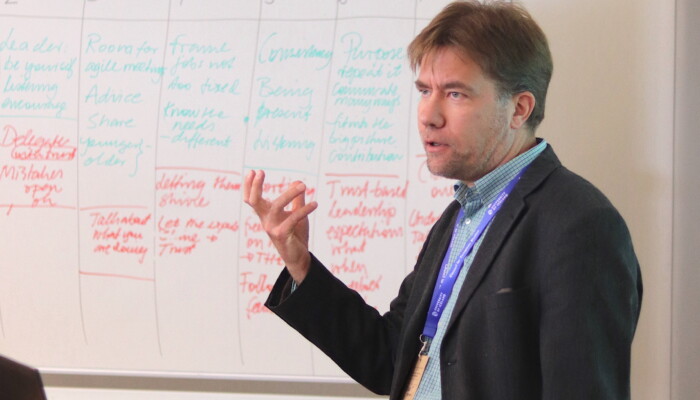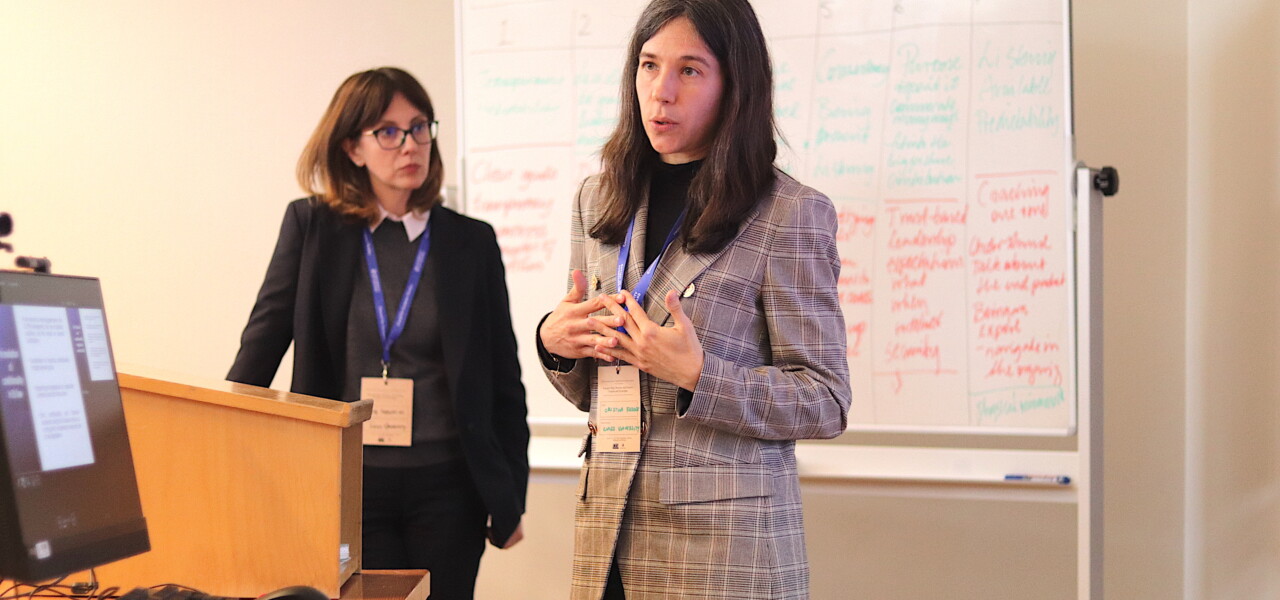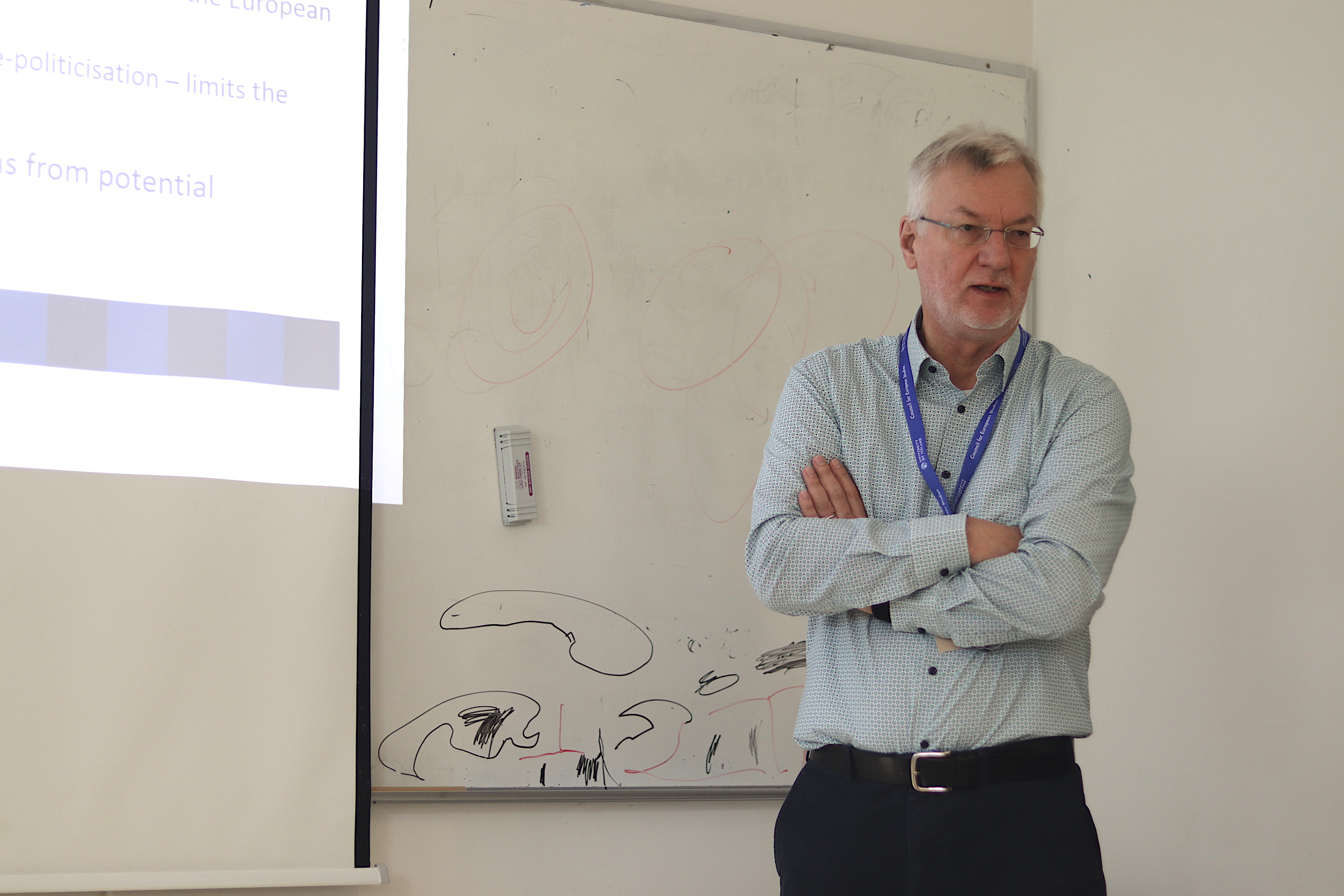The RED-SPINEL delegation to the Council for European Studies 2023 conference on “Europe’s Past, Present and Future: Utopias and Dystopias” arrived in Iceland on June 26th, 2023, to discuss dissensus over liberal democracy and the EU instruments to face it.
Participants from our partner universities and beyond presented 19 papers divided into 4 panels during the symposium entitled “Understanding growing dissensus over liberal democracy and the rule of law”.
Chaired by Professors Ramona Coman and Nathalie Brack the discussions addressed the following questions:
- What is the nature of the current dissensus and how disruptive is it to the EU?
- How have EU institutional actors and instruments contributed and responded to this increased dissensus?
- What are the implications of this dissensus for policy instruments at EU and Member State levels.
Defining dissensus over liberal democracy
The RED-SPINEL symposium began with the puzzle of our project: Are European democracies at a turning point, in a context of growing populism, autocratisation and undemocratic/liberalism, suggested Professor Ramona Coman, principal investigator of this Horizon Europe project, during her joint presentation with Prof. Nathalie Brack
For Professors Coman and Brack democracy is in crisis, “with democratic stagnation, setbacks, and conflicts. Both within and outside Europe, a variety of actors, not only autocrats and populist parties but also other critical actors dissatisfied with the rise of undemocratic liberalism contest liberal democracy and its core pillars”. But what do they have in common?
A discontent with liberal democracy, all while pursuing different goals.
In their working paper “Understanding Dissensus in the Age of Crises: Theoretical Reflecions” presented at CES, Professors Coman and Brack draw attention to the polarization around liberal democracy.
After a decade of crises the harvest is a rise of populist actors (mostly on the right) and the of undemocratic liberalism. The result? Core pillar of democracy are increasingly challenged and democratic institutions, norms are values eroded.
For Professors Brack and Coman, the rise of populism from below, and undemocratic liberalism from the top are at the root of the emergence of dissensus as they are studying it.
These phenomena, they say, have fostered, in some cases, the erosion of democratic institutions, norms, and values “while in others the dismantlement of core pillars of liberal democracy” thus opening paths towards autocratisation”.
In this context, unlike contestation in the 1990s and 2000s, criticism towards liberal democracy as we know it has become mainstream and is no longer an issue restricted to the fringes of society, they claim.

This new understanding of #Dissensus surrounding liberal democracy and its consequences for EU instruments were explored across all four of the panels organized as part of the RED-SPINEL symposium.
Concepts and EU instruments to understand dissensus
The RED-SPINEL symposium at CES started on June 27th with an inaugural panel “Debating the Concept of Dissensus over Liberal Democracy and the Rule of Law” through a series of presentations dealing with:
- Understanding dissensus in the age of crises by Nathalie Brack and Ramona Coman (IEE-ULB, CEVIPOL)
- Constitutional dissensus in the Polish case by Dr Wojciech Włoch and Dr hab. Maciej Serowaniec (NCU)
- Dissensus and the prospects of a European by Martin Deleixhe (ULB, Centre de Théorie Politique)
- Dissensus and consensus narratives in the ‘European way of life’ masterframes by François Foret (IEE-ULB, CEVIPOL)
The symposium continued with the panel on “EU Instruments and dissensus over the Rule of Law” that would unpack:
- Domestic factors and compliance in the case of the CVM in Bulgaria and Romania by Ruth Ferrero(UCM) & Gisela Hernández (IPP-CSIC)
- Rule of Law Regulation by Prof. dr. Aleksandra Maatsch (Jean Monnet Chair, University of Wroclaw)
- Insights from Article 7 TEU hearings by Ramona Coman and Pauline Thinus (IEE-ULB, CEVIPOL)
- National governments and the enforcement of rule of law by Carlos Closa (IPP-CSIC, STG-EUI) & Gisela Hernández (IPP-CSIC)
- The EU budget and the use of conditionality by Cristina Fasone and Marta Simoncini (LUISS)
Day 1 on Social Media

The first panel unpacked & clarified the analytical sallience of the central concept of #Dissensus with presentations of draft papers by @RamonaComan1, @NathalieBrack, @MDeleixhe, & François Foret (@SciencePoULB).
While @LucaTomini served as the panel’s discussant @CES_Europe pic.twitter.com/5jWkIom29r
— GEM-DIAMOND (@GemDiamondPhD) June 27, 2023
The second panel focused on the instruments the EU has to face the growing dissensus over liberal democracy.
Panel n.99 @CES_Europe is the 2nd panel of the @redspinel_eu symposium on “#Dissensus on Liberal Democracy and the Rule of Law”
It included 5 papers which were then discussed by @TCEuropean and a full room of @CES_Europe attendants. pic.twitter.com/MIeBgHdQJd
— GEM-DIAMOND (@GemDiamondPhD) June 27, 2023

EU's Rule of Law Policy & the Actors who Contest It
The RED-SPINEL symposium in CES continued on June 28th with a panel addressing the “the managerial turn of EU’s Rule of Law Policy”, through a series of presentations focused on challenges such as:
- The legitilization of EU economic governance (Andrea Capati and Thomas Christiansen – LUISS);
- EU Responses to the democratic deficit and the rule of law crisis, specifically focusing on European Exceptionalism Under the Managerial Turn (Roïla Mavrouli – HEC Paris)
- “The Paradoxes of EU’s Fight For the Rule of Law” (Louise Fromont – IEE-ULB)
- “Resistance of National Judges to the Managerial Turn of the EU Rule of Law” (Ioannis Michalis – Le Mans Université)
The symposyum ended with the panel “Who is contesting the Rule of Law in Europe Today? Actors of Dissensus”, that included the following presentations:
- Opposing liberal democracy: discursive strategies of populist radical right parties in the EP on the rule of law by Nathalie Brack, Ramona Coman (IEE-ULB)
- Reluctant Actors of Democracy: European Trade Policy and the Democratic Imperative by Frederik Ponjaert (IEE-ULB)
- Illiberal Networks in Hungary, Poland and Romania: exploring their influence on party elites by Leonardo Puleo, Emilien Paulis & Noemi Trino (IEE-ULB)
- Informal Control of Legislative Networks in Armenia, Georgia and Moldova by Marta Matrakova (IEE-ULB)
- Crises, Political Attitudes and Values: Understanding a Fundamental Dissensus about the EU by Sergiu Gherghina (University of Glasgow, UBB) & Sergiu Miscoiu (UBB) -presented by Bettina Mitru.
Day 2 Social Highlights
We are back at @CES_Europe for our second day of debates around #dissensus over liberal democracy. Legitimacy, the ever present challenge of the EU, is studied in our first panel looking into “The Managerial Turn of EU’s Rule of Law Policy” https://t.co/HWpOBxcKHf
— RED-SPINEL Research Project (@redspinel_eu) June 28, 2023

presented preliminary results on collective research on “Illiberal Networks in Hungary, Poland, and Romania: Exploring Their Influence on Party Elites Conservative Think Tanks” @LeonardoPuleo @NoeT__ Emilien Paulis & Gaál Balázs@hhc_helsinki
— RED-SPINEL Research Project (@redspinel_eu) June 28, 2023


